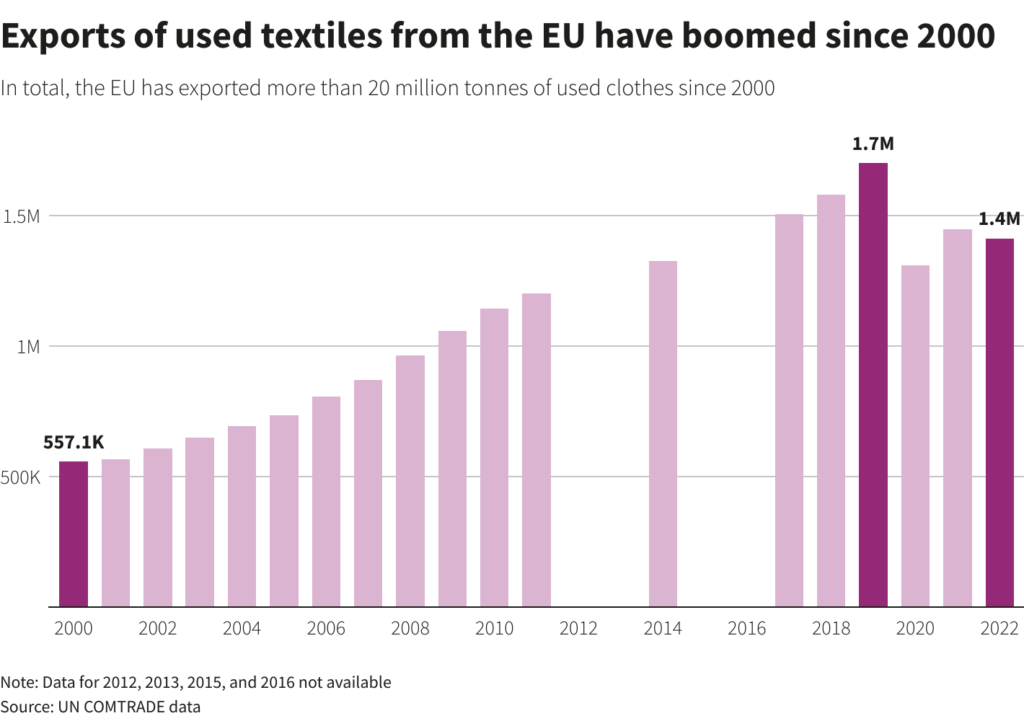EU Cracks Down on Fast Fashion Waste

- The EU is aiming for all textile products sold in the bloc to be made of recycled fibers, as well as being durable, repairable and recyclable by 2030.
- The obstacles to significantly reducing clothing waste are formidable, despite the EU crackdown, industry sustainability commitments and initiatives like the Moda Re expansion.
- Less than 1% of clothes are currently recycled in this manner and the processes are still being developed. Challenges include separating different types of fibre into feedstock suitable for recycling.
- The EU’s legislative push includes rules to make retailers contribute to the cost of collecting used clothes for reuse and recycling.
- The proposed rules would set targets for the amount of textile waste that should be recycled.
The European Union is cracking down on fast fashion waste, with new rules that would require retailers to contribute to the cost of collecting used clothes for reuse and recycling.
The proposed rules, which are still being finalized, would also set targets for the amount of textile waste that should be recycled.
The move is a response to the growing problem of clothing waste in the EU. Every year, the bloc produces around 5.2 million tonnes of textile waste, of which only a quarter is recycled.
The rest ends up in landfill or is incinerated, releasing harmful pollutants into the environment.
Here are some of the key points of the proposed rules:
- Retailers would be required to contribute to the cost of collecting used clothes for reuse and recycling.
- The rules would set targets for the amount of textile waste that should be recycled.
- The rules would apply to all textile products sold in the EU, including clothing, shoes, and textiles used in other products such as furniture.
- The rules would be enforced by national governments.
“It’s a tsunami of legislation,”
said Mauro Scalia, director of sustainable businesses at EURATEX.

The proposed rules have been welcomed by environmental groups, who say they are a necessary step to address the problem of textile waste.
“The EU is taking a leadership role in addressing the global fashion waste crisis,”
said Emma Priestland, head of policy at the Ellen MacArthur Foundation.
Related Article: EU Greenhouse Gas Emissions Fall 3% in First Quarter while Economy Grew
However, some retailers have expressed concerns about the cost of the new rules. They argue that the fees would be passed on to consumers in the form of higher prices.
“We are concerned that these new rules will place an unnecessary burden on businesses and consumers,”
said a spokesperson for the British Retail Consortium.
The EU is still working out the details of the proposed rules, and it is not clear when they will come into force.
In the meantime, some fashion companies are taking steps to reduce their environmental impact.
For example, Inditex, the parent company of Zara, has pledged to use 40% recycled fibers in its garments by 2030.
Puma has also partnered with garment collecting and sorting companies to help collect and recycle used clothes.
These are just a few examples of the steps that fashion companies are taking to address the problem of textile waste.
The EU’s proposed rules are a significant step forward, but they are just one part of the solution. Ultimately, it will take a concerted effort from all stakeholders in the fashion industry to make the sector more sustainable.












